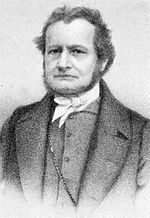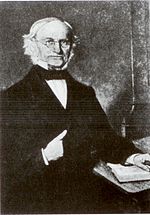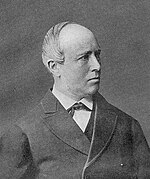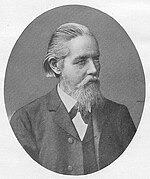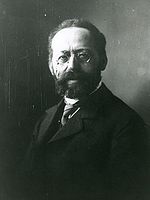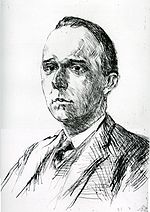List of Classical Philologists at the Christian Albrechts University in Kiel
The list of classical philologists at the Christian-Albrechts-Universität Kiel includes well-known university professors in this subject who worked and are active at the Christian-Albrechts-Universität Kiel .
overview
The beginnings
The ancient languages have been represented since the University of Kiel was founded (1665). Latin played an important role as the language of science in all departments, and Greek as the language of the New Testament in the theological faculty. Greek literature was represented by a full professor; However, after a few years, the holders of the chair usually moved to the theological faculty because of the better salary. Until the early 19th century, Latin and Greek language teaching remained an auxiliary science.
At the end of the 18th century, Classical Philology was gradually established as an independent subject. The first representative of this new direction in Kiel was Torkel Baden , who was professor of eloquence from 1794 to 1804. Since then, the professorship of eloquence has been held exclusively by classical philologists, while theologians and historians had previously been there. Daniel Georg Morhof (1665–1691), Johann Burchard May (1693–1725), Johann Michael Schwaniz (1725–1761) and Wilhelm Ernst Christiani (1766–1793) held the professorship for eloquence before Torkel Baden .
The foundation of the philological seminary (1808)
Torkel Baden's successor was Karl Friedrich Heinrich in 1804 , who had studied with Christian Gottlob Heyne in Göttingen . Heinrich strove to set up a philological seminar. To this end, he fought hard to gain control of the philologicum scholarship , which had served to promote philology students since 1777 and was awarded by professors in the theological faculty until the 19th century. In 1809, the Schleswig government followed Heinrich's advice and set up a philological institute with the funds of the scholarship . The aim of this institute, which Heinrich took over without a government mandate and without a fee, was teacher training.
Consolidation and transition from Danish to Prussian sovereignty
When Heinrich moved to the University of Bonn in 1818, the seminar management was temporarily transferred to the theologian August Twesten . Only in 1820 was a successor to the chair of philology and eloquence found in Wilhelm Wachsmuth . Wachsmuth, a student of Friedrich August Wolf , tried to redesign the seminar. He did not want to run it as a mere scholarship institution, but as a nursery for “real philologists”. However, Wachsmuth did not stay with Kiel for long: in 1825 he accepted a call to Leipzig. His successor (after unsuccessful negotiations with Karl Christian Reisig in Leipzig and Karl Gottlob Zumpt in Berlin) was the Wittenberg high school teacher Gregor Wilhelm Nitzsch in 1827 . He shaped the seminar business for almost a quarter of a century. Various private lecturers worked alongside him, almost all of whom switched to school service after a few years. One exception was Peter Wilhelm Forchhammer , who began teaching in Kiel in 1829 and continued until his old age (1894). In 1836 he received an extraordinary professorship in antiquity and in 1843 a full professorship in philology, the second in this subject. He was actually an archaeologist and also mainly represented archeology in teaching, as well as Greek literature.
Gregor Wilhelm Nitzsch, who had done a lot to train teachers in Schleswig-Holstein for decades, made a name for himself as a German patriot during the Schleswig-Holstein War (1848–1851) and was dismissed by the Danish government in 1852. Again it took two years before a successor was found. Georg Curtius worked in Kiel from 1854 to 1862 and then moved to Leipzig. His successor was Otto Ribbeck , one of the leading Latinists of the 19th century, who had studied with Friedrich Ritschl in Bonn . During his time in Kiel (1862–1872) he reformed the seminary based on the Bonn model. One of his most important students, Erwin Rohde , completed his habilitation with him in 1870 and was appointed associate professor in 1872. In the decades that followed, this extraordinary position was a pillar of teaching at the seminar. After a few years, their owners usually changed to full professorships at other universities.
The Prussian University until the interwar period
Ribbeck's successor was August Wilmanns for a short time and then Eduard Lübbert in 1874 . After he left for Bonn (1881), Friedrich Blass was promoted to full professorial level, so that there were now three full professorships in philology and the professorial professor's office. Lübbert's successor as professor of eloquence was the Silesian Richard Foerster , who served as rector of the university in the academic year 1886/1887. He was succeeded in 1890 by Ivo Bruns , who had previously been an associate professor.
In the 1890s, the number of students in Classical Philology had decreased dramatically. So it was no wonder that Forchhammer's professorship was not filled again after his death (1894), and neither was the professorship (1895). After his departure (1892), Friedrich Blass had a successor in Alfred Schöne . Around 1895 the two full chairs were the only permanent positions in philology.
At the beginning of the 20th century, the situation changed: the number of students increased again. Ivo Bruns died in 1901, and Siegfried Sudhaus was his successor . After his retirement, Schöne was replaced first by Paul Wendland , then by Felix Jacoby (1906). In 1909, Ernst Bickel was again appointed as an associate professor; his successors from 1921 were even Ordinarii. However, the original chair of eloquence, which Werner Jaeger and Christian Jensen held after the brewhouse , fell victim to the economic crisis in 1926.
National Socialism and the Post-War Period
Felix Jacoby, who had made a name for himself in science primarily through his work on Greek historiography, was dismissed during the Nazi era and moved to Berlin; later he emigrated to Oxford. He did not get his chair back even after the Nazi era. His colleague Richard Harder , a staunch National Socialist at the time, moved to Munich in 1941. The two new professors Erich Burck (in Kiel from 1938) and Hans Diller (from 1942) were outwardly adapted to the regime, but kept propaganda content away from the courses and from their research. You stayed in Kiel until the 1970s.
In the post-war period, the number of students, which had fallen rapidly since the 1930s, rose again. In 1962, Manfred Fuhrmann, a third full professor was appointed. He worked in Kiel for only four years; his successor Antonie Wlosok stayed just as long. Along with Ilona Opelt, she was one of the first German women to hold a chair in Classical Philology in Germany.
In the 1960s the number of students continued to rise, so that in addition to the full professors, C3 professors were occasionally appointed, such as Detlev Fehling in 1964 and Fridolf Kudlien in 1974 . Ernst Doblhofer was appointed Erich Burck's successor in 1971 , and Ernst-Richard Schwinge as Diller's successor . The third professorship was converted into a C3 professorship in 1972, which Herbert Juhnke held until 1994 . Another long-time professor in Kiel was Doblhofer's successor, Konrad Heldmann .
In addition to the professors of Greek studies ( Lutz Käppel ) and Latin studies ( Thorsten Burkard and Jan Radicke ), there are currently seven research assistants as well as several lecturers and assistants. Classical Philology is organized in the Greek and Latin Studies departments within the Institute for Classical Antiquity. Other departments are Classical Archeology , Ancient History, and Middle and New Latin .
List of Classical Philologists
The first column shows the name of the person and their life data, the second column shows entry into the university, and the third column shows their departure. Column four names the highest position achieved at Kiel University. At other universities, the corresponding lecturer may have made an even more extensive scientific career. The next column names special features, the career path or other information relating to the university or the seminar. In the last column there are pictures of the lecturers.
|
Chair holder
First ordinariate:
- Karl Friedrich Heinrich (1804-1818)
- Wilhelm Wachsmuth (1820-1825)
- Gregor Wilhelm Nitzsch (1827-1852)
- Georg Curtius (1854–1862)
- Otto Ribbeck (1862–1872)
- August Wilmanns (1873–1874)
- Eduard Lübbert (1874–1881)
- Richard Foerster (1881–1890)
- Ivo Bruns (1890-1901)
- Siegfried Brewhouse (1901–1914)
- Werner Jaeger (1915–1921)
- Christian Jensen (1921–1926)
Second ordinariate:
- Peter Wilhelm Forchhammer (1843-1894)
Extraordinary:
- Erwin Rohde (1872–1876)
- Friedrich Blass (1876–1881)
- Friedrich Leo (1881-1883)
- Christian Lütjohann (1884)
- Ivo Bruns (1884–1890)
- Otto Rossbach (1890–1895)
- Ernst Bickel (1909–1921)
Third ordinariate:
- Friedrich Blass (1881–1892) "Classical philology and eloquence"
- Alfred Schöne (1892–1902)
- Paul Wendland (1902–1906)
- Felix Jacoby (1907-1935)
- Erich Burck (1938–1969)
- Ernst Doblhofer (1971–1984)
- Konrad Heldmann (1985-2005)
- Thorsten Burkard (since 2005)
Fourth ordinariate:
- Johannes Stroux (1922–1923)
- Eduard Fraenkel (1923–1928)
- Richard Harder (1930-1941)
- Hans Diller (1942–1973)
- Ernst-Richard Schwinge (1976–1999)
- Lutz Käppel (since 1999)
C4 professorship:
- Manfred Fuhrmann (1962–1966)
- Antonie Wlosok (1968–1972)
C3 professorship:
- Herbert Juhnke (1972–1997)
- Lore Benz (1997-2001)
- Hans Bernsdorff (2002-2003)
- Jan Radicke (since 2004)
literature
- Helga Plöger: Studies on the history of classical philology at the University of Kiel (1773-1852) . Kiel 1972 (dissertation)
- Friedrich Volbehr , Richard Weyl: Professors and lecturers at the Christian Albrechts University in Kiel 1665–1954 . Fourth edition, edited by Rudolf Bülck, completed by Hans-Joachim Newiger. Kiel 1956 (Publications of the Schleswig-Holstein University Society. New series, No. 7)
Web links
Individual evidence
- ^ History of the subject of sport at the Christian Albrechts University in Kiel
- ^ Personnel reports June 2010 of the Christian-Albrechts-Universität zu Kiel
- ↑ Personnel and course catalog WS 1955-56 of the Christian-Albrechts-Universität zu Kiel p. 15
- ^ Westfälische Wilhelms-Universität Münster, Institute for Classical Philology: Institute for Classical PhilologyZur Person. In: www.uni-muenster.de. Retrieved September 20, 2016 .

